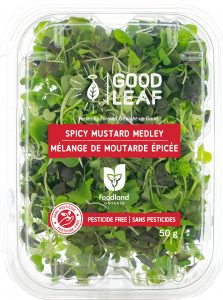McCain ups investment in vertical farming brand GoodLeaf
Buoyed by a new investment round from McCain Foods, vertically farmed produce brand GoodLeaf is embarking on what it calls an “aggressive” growth plan that will include the creation of growing facilities in both Eastern and Western Canada.
The latest investment round, which brings McCain’s total investment in GoodLeaf to more than $65 million, will enable the Guelph, Ont.-based company to grow both its retail and foodservice footprint, said CEO Barry Murchie.
“We’ve spent a lot of time getting our foundation in place and getting the fundamentals right, and now this is our opportunity to create a network to really meet the needs of Canadian consumers,” said Murchie, who spent more than 20 years with McCain prior to joining GoodLeaf in 2018.
McCain’s chief growth and strategy officer Peter Dawe characterized the frozen food giant as a “helpful investor,” albeit one possessing the resources and expertise to transform GoodLeaf into a global brand. McCain made an initial investment in GoodLeaf’s parent company, TruLeaf Sustainable Agriculture, in 2018.
“I think
Dawe said the investment provided McCain with valuable exposure to other aspects of the consumer diet, which is helpful as they become more mindful not just of the importance of healthy eating, but also factors such as sustainability.
“Frankly, it checks all the boxes for us if we think about where the consumer is going,” he said. “It’s a delicious product, it’s healthy, it allows us to access another daypart, and frankly the sustainability and freshness benefits are really compelling.”
The new funding round will be used to build additional vertical farms, improve the AI and machine learning that goes into GoodLeaf’s automated facilities, as well as R&D around seed selection, brand development and raising consumer awareness of vertical farming as a whole, said Murchie.
GoodLeaf began selling through retail channels last year, with current partners including the Loblaw Companies Limited banners, as well as Longo’s, Whole Foods and specialty retailers. The company is also in the midst of finalizing a distribution deal with Sobeys, and has made some tentative inroads with home delivery services, said Murchie.
While GoodLeaf’s current retail footprint is mostly centred in Ontario, the new funding round will enable it to scale operations across the country, with two new farms slated to be complete before the end of 2021.
GoodLeaf’s produce is grown in fully automated indoor environments that allows for the exact amount of sunlight, irrigation, nutrients and airflow as needed to create an optimal product. “It’s like an absolutely perfect environment,” said Murchie. “In vertical farming you take all of the variability out, and you really dial in an optimal recipe for all the plants. It’s fundamentally a better way to grow leafy greens.”

GoodLeaf’s products are divided along two lines: microgreens (Spicy Mustard Medley, Asian Blend, Micro Arugula, Micro Radish and Pea Shoots) and baby greens (Ontario Baby Kale, Ontario Baby Arugula and Ontario Spring Mix).
Microgreens are a less mature plant that carry significantly more nutrients than their full-grown counterparts, said Murchie. In open-field farming, those nutrients go towards helping the plants grow and mature, but harvesting them at an early stage—GoodLeaf’s products go from seed to package in just 18 days—means they feature what he calls an “explosive flavour” not found in their open-field counterparts.
“Like most people who buy leafy greens, I’ve been conditioned to pick up the package, shake it around, and look at the bottom to see if there are mushy leaves in there, look at the date code and pick the best of the worst,” said Murchie. “
At full capacity, the Guelph facility will yield approximately 850,000 pounds of produce per year, with Murchie saying the goal is for its output to be roughly divided between retail and foodservice.

